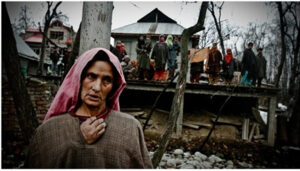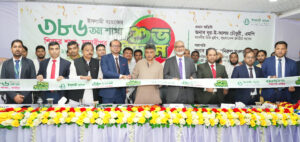 Md Jubair: 75 years have passed since the British imperialists decolonised the subcontinent leaving the region divided and Kashmir invaded and occupied by its neighbour, India. As a result, Kashmiris were gripped by a never-ending cycle of state-sponsored violence and terror.
Md Jubair: 75 years have passed since the British imperialists decolonised the subcontinent leaving the region divided and Kashmir invaded and occupied by its neighbour, India. As a result, Kashmiris were gripped by a never-ending cycle of state-sponsored violence and terror.
On October 28, 1947, in the final days of British rule, India invaded and occupied Kashmir with the blessings of British viceroy Mountbatten. There was a deep web of conspiracies orchestrated behind the scenes by an aggressive team under Pandit Nehru. Indian forces had already clandestinely intruded deep into Kashmir even while Jammu and Kashmir were still under Maharaja Hari Singh’s rule which was facing a popular uprising of his own, including an armed rebellion in the Jammu province. The Maharaja was weighing his options. He had jailed Kashmiri popular leader, Shaikh Abdullah and committed a civilian massacre of Muslims in Poonch. That bloody massacre fuelled outrage against Dogra rule. Jammu Muslims shared kinship with neighbouring Muslim tribes of the north-western frontier, who naturally could not stand by idly and watch their fellow kinsmen being butchered ruthlessly next door in Jammu and Kashmir.
Pakistan had a moral duty to intervene, but it was too little too late. In Poonch and Jammu a genocide, a quarter million Muslims were executed and over half a million were forced to flee across the border into Pakistan. To this day they have not been allowed to return to their homeland. As resistance mounted, India took the matter to the UN Security Council for its intervention. The UN Security Council did intervene and brokered a ceasefire between the warring parties and passed more than a dozen resolutions, including the following resolutions to secure a permanent solution to the conflict in the subsequent years: UN Resolution 39 of January 20, 1948, to achieve a ceasefire and Resolution number 47 of April 21, 1948, to implement a fair and impartial plebiscite between India and Pakistan.
Resolution # 91 of 1950 spelt out very clearly that any action the so-called Constituent Assembly of Jammu and Kashmir might attempt to take to determine the future shape and affiliation of Kashmir would not constitute a disposition of the state by the principles of a free and impartial plebiscite conducted by the United Nations. Unfortunately, the UNSC’s monumental failure to force India to hold a plebiscite in Kashmir has led to three wars between India and Pakistan and enormous human suffering over the last 75 years. The region’s future remains in peril with three nuclear powers—India, Pakistan and China standing face to face with each other. The matter remains unresolved and this is a monumental failure of the UNSC, to be unable to force India to let the Kashmiris exercise their right to self-determination.
Faked and rigged elections in Kashmir have failed. Ruling through local puppets and corrupt quislings has been tried by many Indian regimes without success. The UN and influential Western and Muslim nations have betrayed Kashmiris. Disillusioned and exasperated Kashmiris, particularly successive generations of Kashmiri youth, will try whatever strategies and tactics they can to push back against Indian strategies and tactics of oppression colonisation and Indian state terror. The Modi regime’s terror tactics and mass imprisonments will fail as did those of its predecessors. The trigger of violence has always been the sight and sound of Indian soldiers terrorising and humiliating Kashmiri civilians.
The rebellion of 1990 was crushed with overwhelming and ruthless forces of over 800,000 military and paramilitary forces. The most militarised region under one of the most brutal regimes in the world has not seen a day of peace since 1990. The Modi regime is the worst by far. Not since the days under the infamous Jagmohan, the butcher of Kashmir in 1990 has Kashmir seen the level of oppression and state terror. On the intervening night of August 4 and 5, 2019 a deathly calm and eerie silence fell on Kashmir. Whispers of silence spread across Kashmir. They sounded like the trumpet of the doom’s day resonating with the diaspora ten thousand miles away in the United States when a gleeful Indian government announced a total lockdown and blackout throughout the valley of Kashmir. No soul could come out of their homes, no businesses could open. Overnight thousands of additional troops were ferried in. Thousands of them were suspected to be paramilitaries and RSS private militia of the well-trained Saffron forces. All electronic civilian communication lines were cut in the neighbourhoods and beyond. The only beings that moved were the inhuman military and police beasts. At its peak as many as 13,000 children were reported to be held in detention centres. Most families did not know where their children were held. The horror and terror in neighbourhoods were such that no one knew who would be next. Many that were taken away were never to come back just like in the 1990s.
Schools and colleges were closed for nearly eight months—way before Indians themselves were forced to close their own by the pandemic. All in all, Kashmiris suffered isolation, lockdown and blackout nearly a year before the Covid-19 pandemic. This all was done under the RSS/BJP regime of Narendra Modi to implement a new plan in Kashmir. He had already dissolved the Kashmir Assembly and Kashmir government on Nov 18, 2018, as a prelude to what was to come, which people knew would happen.
India abrogated article-370 and 35-A. These articles were jointly negotiated between the Indian and Kashmiri governments on October 17, 1949. Article 370 of the Indian constitution granted Kashmir internal autonomy and authorisation to draft its constitution. Under article-35A Kashmiri citizens alone had the domicile right: to vote and be elected in elections, the right to own immovable property and hold public sector jobs. No foreigners, including Indian citizens, would have those rights in Jammu and Kashmir.
Under previous regimes, the Indian parliament did incrementally undermine and erode these constitutional guarantees. But it was the fascist government of PM Modi that dealt the final mortal blow to Kashmir with its proud historic Kashmiri identity on August 5, 2019, by abrogating Articles 370 and 35-A. Most Kashmiris never believed a word of any Indian leader, not even Mahatma Gandhi, let alone Narendra Modi, but it took a fascist Hindu regime to prove the sceptical Kashmiris right.
A possible solution to the Kashmir crisis:
United Nations Security Council resolutions provide the only firm basis to resolve the Kashmir conflict. It recognises the fundamental right of all nations to determine their right to self-determination under international law. Modalities and specifics of implementation can be determined by representatives of the three parties to the dispute—India, Pakistan and legitimate political representatives of the erstwhile state of Jammu and Kashmir. The dialogue can be mediated by a credible mutually acceptable third-party mediator, such as the UN or a neutral third party.
Pending such an approach the conflict can go on indefinitely leaving the possibility of a nuclear catastrophe, including an unintended one. To de-escalate the conflict, India must pull out its occupation forces from neighbourhoods, and release from its vast network of prisons all political prisoners, human rights defenders, journalists, and social media activists. India must repeal the illegal orders that abrogated article-370 and 35-A passed on August 5, 2019. It must abolish all laws passed or implemented in pursuit of a settler-colonialist project and an apartheid state in Jammu, Kashmir and Ladakh.






